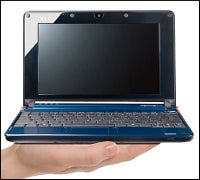 |
| Acer Aspire One netbook Source: Acer |
Experts and PC industry insiders have long wondered whether bare-bones netbooks were too cheap for manufacturers’ own good.
But don’t tell that to Acer.
The Taiwanese PC maker and Best Buy dropped the price on the company’s Aspire One netbook to $299.99, as part of a holiday promotion that runs through Saturday. The unit typically sells for $349.
Netbooks — lighter, more portable versions of notebook PCs — are becoming increasingly popular alternative for mobile users because their smaller size makes them easier to travel with. Also, since many are paired with solid-state drives (SSDs), the devices enjoy a longer battery life and spring to action in seconds, versus the minutes it takes most notebook and desktop computers to fully start up.
On the pricing front, netbooks are seemingly in a race to the bottom with PC notebooks, which have also dropped to as little as $399 in holiday promotions for low-end models. But notebooks can’t match the portability of netbooks: The Acer Aspire One, for example, sports an 8.9-inch display and Webcam in a
package that weighs only 2.18 pounds. The system includes Windows XP Home, Wi-Fi and is powered by Intel’s Atom N270 processor running at 1.60 GHz.
Acer sent out a release touting the $299 exclusive with Best Buy, but the same deal is available from at least one other retail outfit online. Fry’s listed the same model this week for $299.99 with free shipping at its online store.
However, potential netbook buyers might be better off paying a bit more for
another netbook that offers more storage and battery life, either from Acer or one of it’s many competitors, including Asus, HP, Dell and Lenovo.
Several vendors, including Acer, offer netbooks with more battery life than the approximate two-and-a-half-hour life of the Acer Aspire One featured in the Best Buy deal, which ships with a small, three-cell battery.
Also, the $299 Acer model includes an 8 GB SSD drive (plus an 8 GB secure digital card) which could fill up pretty quickly with large media files.
But Acer also offers a second model for $349, which includes a 120 GB hard disk and a six-cell battery that more than doubles battery life. At the same time, a full-fledged notebook could offer still more battery life and storage.
Still, the cheaper model may have its advantages: The SSD drive does offer faster boot up time and is considered more reliable than traditional hard drives.
“The $299 is a price breakthrough, but the $349 model is a much better buy,” said Creative Strategies analyst Tim Bajarin. “It sounds more like a loss leader to get you to come in the store.”
Other industry observers have expressed the same thoughts about the new category of PC. And with hardware manufacturers margins already razor-thin, some have questioned the wisdom of participating in a market like netbooks.
Lenovo, for instance, faced some concern over its tone of caution on netbooks, telling Reuters that the category is a “big double-whammy. They’re lower margin, it’s like Frankenstein. You created it, you hate it but you cannot kill it because that’s what selling.”
Netbook or mini-notebook?
Yet the proliferation of ever-smaller netbooks may be reaching its end. Bajarin noted the trend among manufacturers is increasingly to beef up netbooks with more storage, memory and features that gets away from the original idea for what a netbook should be.
Asus, for instance, began with its first-generation Eee PC netbook, which pioneered the netbook category and sported a seven-inch display. Today, it offers a product line that includes 19 different netbooks. Those include models with nine- and 10-inch displays, 170 GB hard drives and up to eight hours of battery life — each of which carries an increasingly steep price tag.
And Asus is far from the only vendor broadening its lineup of netbooks.
“They’re becoming more like mini-notebooks,” Bajarin told InternetNews.com.
“But the original netbook vision is to get you on the Net for the majority of your functionality and storage” in the cloud.


